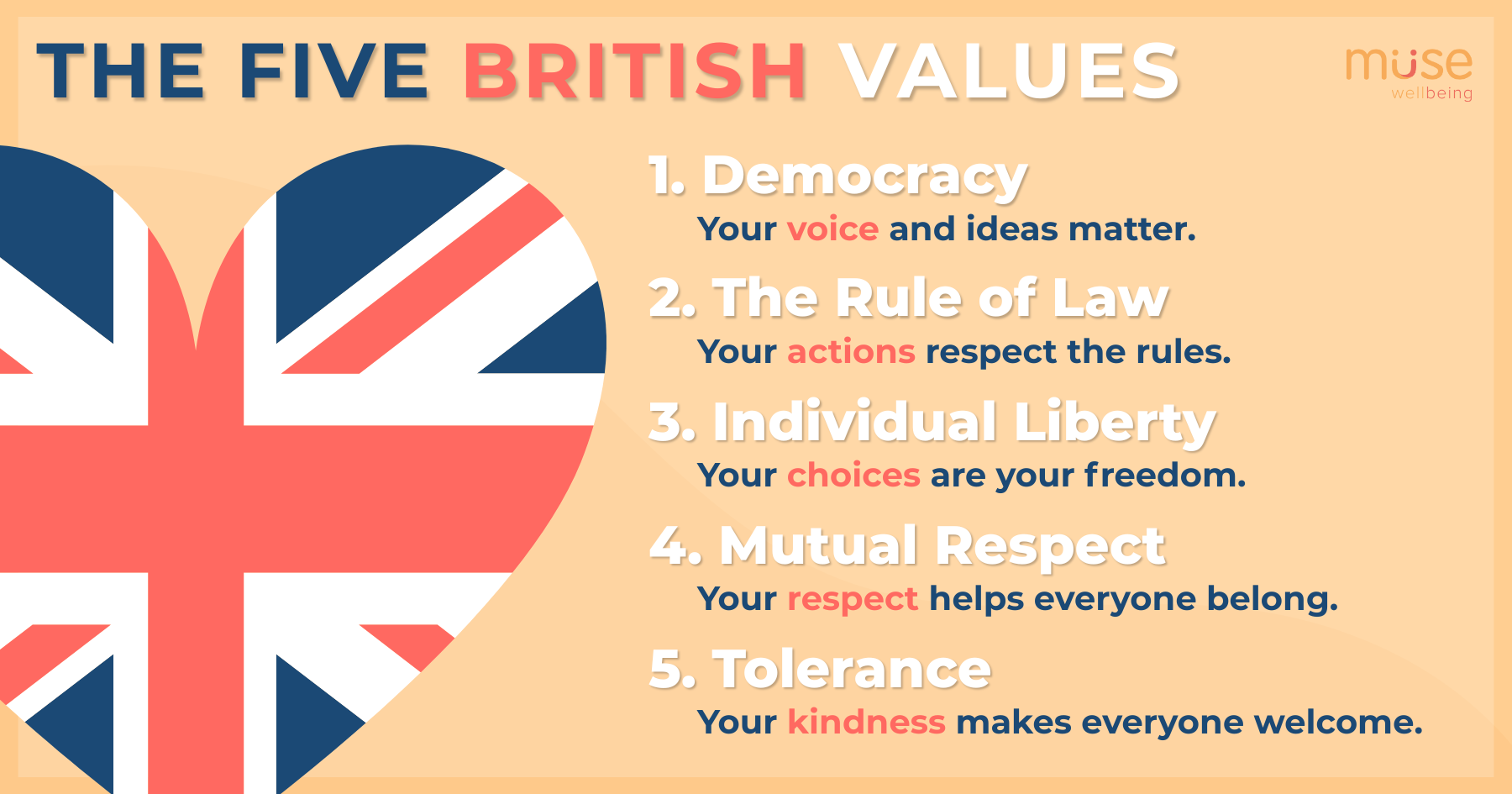British Values Posters for Schools: Inspiring Citizenship
Jun 18
/
Muse Wellbeing

Author: David
David is the Muse Wellbeing director and lead curriculum developer. His Main passions include education, surfing and travelling.
David is the Muse Wellbeing director and lead curriculum developer. His Main passions include education, surfing and travelling.

Edited/Reviewed: George
George is an international school teacher based in Asia. A passionate language learner and polyglot, he thrives in diverse classrooms.
George is an international school teacher based in Asia. A passionate language learner and polyglot, he thrives in diverse classrooms.
Shaping responsible, respectful and engaged UK citizens requires a strong imparting of British values. To develop a strong sense of community, fairness, democracy and other such core principles, schools across the country are encouraged to teach and promote British values to young students. Such values include the fostering of inclusivity, respect for others and an innate understanding of the guiding principles underpinning British society.
One of the most effective methods for reinforcing these values is through the use of visual learning means. For example, placing posters around the school serves to reinforce key principles of the British values and encourage students to think about applying them to their own lives. Posters can fire discussions, helping students to explore and discover their role in a diverse democratic society together.
British values posters are an engaging educational resource, making these fundamental principles more accessible to young learners.. Whether displayed in classrooms, hallways or other shared spaces, posters can serve to reinforce positive behaviour and promote — both inside and outside of school — a culture of respect and inclusion.
What Are the Five British Values?
As part of the UK government’s efforts to promote social cohesion and inclusivity, the Prevent Strategy (2011) introduced five core British values. In 2014, the Department for Education (DfE) mandated schools to actively teach the values to guide students’ spiritual, moral, social and cultural (SMSC) development. The five British values are as follows:
1. Democracy
Democracy forms the foundation of a fair society, where everyone has a voice and the possibility to make change. Teaching of democratic values imparts to students an understanding of voting, decision-making and active participation in discussions on real topics affecting them, guiding them to realise their and others’ rights and responsibilities in our democratic system.
2. The Rule of Law
Rule of law is a principle based on applying the law equally to all, without distinction to class, income, race and so on. It maintains order and fairness in society. When taught in schools, students are helped to understand and appreciate school rules, national laws and the importance of justice both in everyday life and at the societal level.
3. Individual Liberty
Individual liberty enshrines the right for everyone to make free choices and express their thoughts. In schools, encouraging individual liberty promotes personal responsibility, creativity and respect for others’ viewpoints and way of looking at the world. At the same time, students gain an understanding of the limits of freedom within a free and safe society — that freedom must be exercised responsibly and with respect to others.
4. Mutual Respect
Kindness, compassion and understanding form the basis of mutual respect, especially regarding differences in opinion and lifestyle. When the principle of mutual respect is taught in schools, it fosters positive relationships, teamwork and a strong sense of community among students from all backgrounds.
5. Tolerance
Tolerance teaches respect and understanding of different cultures and religions. In schools, tolerance is promoted by celebrating diversity, increasing awareness and knowledge of world religions and cultures as well as encouraging discussions and learning about differing worldviews.

Teaching British values in schools creates a more inclusive, respectful and engaged student population, both within and beyond the school boundaries. With such citizenship skills and awareness of social responsibility, a UK study found that students actively engaging with these British values show greater social cohesion and inclusivity of those from differing and diverse backgrounds.
Why British Values Matter in Schools
British values help students to frame their moral compasses and to understand their role in society. Such values create the foundation for respect, fairness and responsible citizenship, which further shape students’ way of thinking — becoming engaged, thoughtful and able to contribute positively to their school and communities.
Teaching British values in schools helps to prepare students for life beyond education. Through understanding the five values — including democracy, the rule of law and individual rights — children learn how society functions best when reinforced by respect and tolerance, leading to a harmonious and inclusive national community.
When incorporated into the school curriculum, British values reinforce social cohesion, supporting students from different backgrounds to feel included and valued. Encouragement of discussion on democracy, the law and diversity helps to prevent discrimination and fosters an atmosphere and culture of understanding each other. Data shows that schools in which British values are actively promoted see improvements regarding behaviour, respect and student participation in civic life.
When Are British Values Taught in UK Schools?
Embedded throughout the UK school curriculum, British values are taught in a variety of ways. The values are primarily taught in the personal, social, health and economic (PSHE) and citizenship classes. Usually, the values are deeply integrated into the daily school routine, including assemblies and discussions about current events.
At the primary level, British values are often introduced to young students as part of the wider PSHE curriculum. In PSHE classes, children explore topics such as fairness, decision-making and respect for others. Storytelling, role-playing and group discussions are often used to help young learners understand these concepts and utilise them in a relatable, localised way.
At Muse Wellbeing, we offer lesson plans and advice on teaching British values — designed to engage young students in meaningful and relevant discussions that encourage respect, inclusion of others and responsible citizenship. Our lessons follow a structured approach to equip teachers with the skills and know-how for teaching students about British values in a way that resonates with them.
British Values on Display with Student Posters
Displaying educational posters around the topic of British values throughout the school is a powerful and constant way to reinforce the key principles. They serve as visual reminders, often seen every day, helping students to internalise the values and apply them in their everyday situations.
Students can be encouraged to create their own British values posters, which can be an engaging learning activity. This allows them to interpret the values in their own words, in their own interpretations. It engages students’ creative abilities and helps them make connections between the values and situations in their own lives. By making posters themselves, students take the values to heart, making them meaningful, memorable and actionable.
Muse Wellbeing
Subscribe for RSHE & Wellbeing Updates & Learning Resources
Receive essential information on RSHE and wellbeing for your school and community
Thank you!

Copyright © 2026 Muse | All Rights Reserved.
Would you like to logout of Muse Wellbeing?


